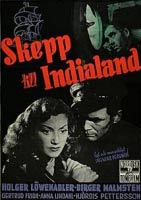A Ship Bound for India (Swedish: Skepp till Indialand) is a 1947 Swedish film directed by Ingmar Bergman. It was originally released as A Ship to India in the United Kingdom and Frustration in the United States. The screenplay was written by Bergman, based on the play by Martin Söderhjelm.[1]
| A Ship Bound for India | |
|---|---|
 | |
| Directed by | Ingmar Bergman |
| Screenplay by | Ingmar Bergman |
| Based on | Skepp till India land by Martin Söderhjelm |
| Produced by | Lorens Marmstedt |
| Starring | |
| Cinematography | Göran Strindberg |
| Edited by | Tage Holmberg |
| Music by | Erland von Koch |
| Distributed by | Nordisk Tonefilm |
Release date |
|
Running time | 98 minutes |
| Country | Sweden |
| Language | Swedish |
The film is about the relationships within a family, a subject with which Bergman often dealt in later films, and uses other common devices of Bergman such as the hard father figure.
Birger Malmsten, who plays the lead character Johannes, went on to feature in several later Bergman films.
The film was entered into the 1947 Cannes Film Festival, where it competed for the Palme d'Or, which was known at the time as the Grand Prix.[2]
Plot
editJohannes is a sailor who returns home after seven years of travel and finds Sally, the girl he once loved, and many memories resurface in him. Realizing that he still loves her, he declares it to her but Sally rejects him. Johannes walks wandering on the beach and thinks back to the past, to something that happened seven years ago during a marine recovery. Since Captain Blom, his father, is absent, Johannes, in order to keep the sailors under control, takes command of the operation. Meanwhile, Blom goes between one tavern and another and in one of these he starts a fight and, after courting a girl named Sally, he takes her away with him. Blom is later diagnosed with a serious eye disease that will lead to blindness.
Sally goes to live in the Blom family's boat, but furious arguments break out between Johannes and his abusive father. Johannes and Sally fall in love and this causes Blom's anger to become even stronger. While Blom's wife tries to persuade her husband to return to her, Johannes and Sally make love in an old mill and Sally later confesses to the captain her love for Johannes. A heated discussion ensues in which Sally tells Blom that he is a total failure.
During the resumption of the recovery operation, where Johannes works under the keel as a diver while Blom is in charge of the pump, the latter tries to kill his son by interrupting the flow of air that goes to the diving suit. Johannes is saved, but Blom, in a fit of madness, plunges the recovered wreck into the sea and destroys everything. When the police arrive to arrest him, he throws himself out of the window, nearly killing himself.
After this shocking episode, Johannes embarks as a sailor and leaves for India, while Sally returns to sing and dance in the seedy club where she worked before. Before Johannes departs, he promises to take Sally away with him one day.
Seven years later, where the film began, Johannes goes back to Sally and reminds her of his promise. Initially, Sally resists and tells Johannes she wants nothing to do with him. After much insistence by Johannes, Sally eventually agrees to go away with him and they both depart on a ship together.
Cast
edit- Birger Malmsten – Johannes Blom
- Holger Löwenadler – Kapten Blom
- Anna Lindahl – Alice Blom
- Gertrud Fridh – Sally
- Naemi Briese – Selma
- Hjördis Petterson – Sofi (as Hjördis Pettersson)
- Lasse Krantz – Hans
- Jan Molander – Bertil
- Erik Hell – Pekka
- Åke Fridell – Variety hall owner
- Douglas Håge – Customs officer (scenes deleted)
- Uncredited
- Ami Aaröe – Young girl at the beach
- Torgny Anderberg – Man
- Ingmar Bergman – Man wearing a beret at the funfair
- Rolf Bergström – Blom's companion
- Torsten Bergström – Blom's companion
- John W. Björling – Older man
- Ingrid Borthen – Girl on the street
- Gustaf Hiort af Ornäs – Blom's companion
- Svea Holst – Woman present at the arrest of Blom
- Kiki – Dwarf
- Uno Larsson – Older man with glasses and hat
- Peter Lindgren – Foreign sailor
- Gunnar Nielsen – Young man at the beach
- Charles White – Black sailor
References
edit- ^ Vermilye, Jerry (2002). Ingmar Bergman: His Life and Films. Jefferson, North Carolina: McFarland. pp. 56–57. ISBN 0786429593.
- ^ "Festival de Cannes: A Ship to India". festival-cannes.com. Retrieved 2009-01-05.